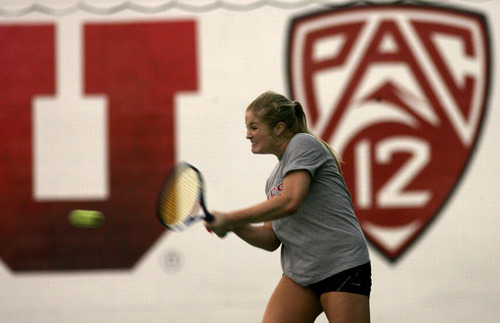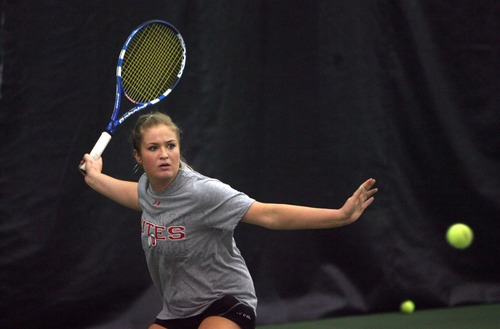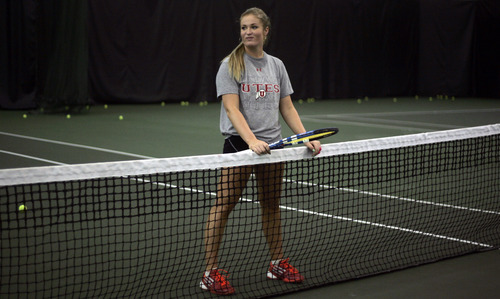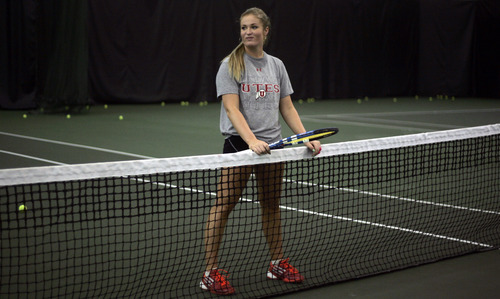This is an archived article that was published on sltrib.com in 2012, and information in the article may be outdated. It is provided only for personal research purposes and may not be reprinted.
Natasha Smith grabbed the cash and ran. Her mom had left $300 in an unattended purse in the family's Palm Springs, Calif., home, plunder Natasha clutched and counted as she slipped out the door and disappeared into the black night. She called for a cab at 11 p.m. to take her away from her former life and into a new one in Los Angeles or Las Vegas or wherever her fresh funds might lead her.
Turns out, they led her to a restroom on the sand at Long Beach, where a man pulled a knife on her in a failed attempt to rape her.
She was 13 years old.
Too young to get mixed up in what she was doing, too troubled to stop herself from doing it.
Five years later, last week, Smith crushed balls across the net as a member of Utah's women's tennis team. She looked to be a world away from her tormented past. She looked … perfect. But nobody, not even she, knows — yet — if that dark world will return.
At 13, Smith's life had been mostly a vision of the American dream, by way of Canada. The daughter of wealthy parents, Geoff and Alexandra Smith, she was born in Calgary, Alberta. She started into youth sports, settling on tennis, and quickly caught the eye of coaches, one of whom pronounced, after seeing her play, that she one day would become a national champion.
To help facilitate that, and seeking a better location to live, the family moved when Natasha was 10 to Palm Springs, where she was enrolled in an exclusive academy run by renowned tennis professional Jose Higueras. The academy accepted only select junior prospects, most of whom were from foreign countries. It was not uncommon for Roger Federer or Rafael Nadal to drop by for a tuneup under the watchful eye of Higueras, who trained the young ones to follow a similar path. Smith practiced for five hours a day and conditioned for another hour. In that environment, she prospered, becoming the No. 1 player of her age group in California, and one of the top prodigies in the United States.
"It was a lot for a 13-year-old," she says. "I kind of missed being a normal kid."
—
Spin out begins • But Smith was not normal. She was on the early expressway to turning pro … until she drank alcohol for the first time, and then the second, then the third. Shortly thereafter, she decided she didn't want to play tennis anymore, she wanted to party. She wanted to drink and do drugs with her friends.
Alexandra and Geoff Smith, who hadn't pressured or pushed their daughter to play tennis — "They were good tennis parents … whenever I lost matches, they took me to Dairy Queen," Smith says — and they supported her decision, despite their heavy investment, when she bailed on the game.
But they didn't know the real reason for it.
Suddenly, she had time to waste, and time to get wasted, which she did on a regular basis. At the family's summer home in British Columbia, Smith sneaked out at night with friends on the family boat, where she says, "we drank, smoked weed and did hallucinogens."
After a series of particularly frightening events, including when Smith passed out, Geoff Smith stepped in and insisted that the whole family enroll in a rehab program at the Betty Ford Center for a week. Later, he sent Smith to a rehab facility in Malibu for nearly four months. He knew she was young and disturbed and it played on his mind that he, too, had once been vexed by his uncontrolled cravings for strong drink.
"I think I was in love with sobriety," he says.
A couple of years earlier, on more than one occasion, Smith had found her father drunk and passed out in their home. One night, after going to dinner with her, Geoff entered the house and, forgetting that his daughter was still outside, locked the door behind him, and fell unconscious to the floor. Smith eventually crawled in a window and tried to wake her father, but couldn't.
"That was scary," she says.
And that was the last personal defeat of that kind for Geoff Smith. He had suffered through years of alcohol abuse. "I was a troubled adolescent," he says. "When I was 17, I was doing some unspeakable things." As an adult, he finally went to rehab and left alcohol in his rearview.
For Natasha Smith, though, substance abuse was still straight ahead.
That inescapable fear ravaged Geoff Smith the night his daughter stole his wife's money and ran off to Los Angeles. Racking his brain over where she had gone, he guessed that she might have headed to the city because she'd whispered — fantasized, he thought — about pulling a Jim Morrison and going to Venice Beach to trip out on heroin. Geoff Smith piled in his car the next day and drove like a madman toward L.A., hoping he somehow could track her down and bring her home.
"I was talking on the phone to a friend, who was an addiction expert, bawling my eyes out as I drove," he says. "She was 13! I could barely control the vehicle. Ten minutes later, my phone rang. Natasha was at the bus terminal in Long Beach. She had a bus ticket to Vegas. By then, I was just 20 minutes away. I went and picked her up. That was a dark, dark time for us."
—
Another distraction • The effects of Smith's 115-day stint at the Malibu rehab center lasted for a little less than a year. She attended daily and then weekly sobriety meetings before she met a 19-year-old man at the same meetings who had just gotten out of prison. The two started secretly dating. Smith had been seeing a psychiatrist, was vulnerable and taking antidepressants, and, when her parents found out about the relationship, they forcefully forbade her from seeing her friend. They also got a restraining order put in place. She says at that point she "freaked out" and threatened to "end it all."
"This guy was super controlling," she says. "But I thought I loved him. I was so defiant."
The Smiths then admitted their daughter for observation at what she calls a "psych ward" at a mental hospital in Indio, Calif.
Thereafter, they straightaway sent her to a different rehab facility in Tucson, Ariz., this one specializing in adolescent behavioral problems. She was there for 50 days.
The stay had no real positive effect.
"I was still defiant, telling my parents to f—- off," Smith says. "I still thought I was in love with this guy."
Says Geoff Smith: "She was caught in a perfect storm of culture, hormones and family addiction history. We were able to see she was engaging in extremely unhealthy behavior. She tried to take away our power as parents. And she turned her back on all her potential. She could have had a full-ride scholarship in tennis at Stanford or Duke. She had been a straight-A student. Now, she was indifferent. She wanted to run her life her way. She was manipulative, strong physically, and she had a strong personality."
—
Back to rehab • Smith's next involuntary move was to a closely supervised institution, the Family Foundation School, in upstate New York, a place she describes thusly:
"It was a therapy boarding school. It was a hellhole. It was lock down. You were never alone, you got one 10-minute phone call with your parents once a week. You slept with 10 other girls in a trailer. There were timed showers. You had to go to chapel at 6 a.m. and had to shovel snow at 4:30 in the morning. They tried to break you down. It was so strict, not abusive, but you had to finish your meals, the food was gross, and if you swore, you had to sit in a corner for hours. I went insane there."
After one month, on her 15th birthday, which was Aug. 26, 2009, Smith and another inmate/classmate decided to bust out. They ran away from the school, which was hardly uncommon at that facility, but their path led them into Pennsylvania, where they broke into an unoccupied home. They slept there for a few nights, finding and drinking bottles of liquor, and trashing the place.
"We got drunk out of our skulls," she says. "We met some construction workers nearby who had some weed, so we partied."
Afraid the homeowners would return, the girls walked to a nearby town, where they stayed in an upstairs room of a stranger's bar. That's when Smith ran out of options. She called her parents and asked if she could come home. To her surprise, they gave her only two choices — return to the school or be arrested by police.
"We were beside ourselves," Geoff Smith says. "But we had a gun to our heads and had to do the right thing. We stayed the course."
That course included another year for Smith at the school.
"For six months, I stayed defiant," she says. "I refused to get out of bed. I had meltdowns. They'd have to restrain me. They put me in a 6-foot-by-6-foot room. One time, I was there for two days. I remember a staff member telling me how much potential I had as a person and that I was throwing it all away. That hit me hard. From that day forward, I started to try. I messed up again, but at least I tried."
—
Starting over • Finally, after 13 months, Smith called her parents and informed them she was ready to start over, ready to start studying and doing something productive away from school — play tennis.
Her parents agreed to bring her home.
"That was the happiest I'd ever been," she says.
For six months, she worked diligently in her mulligan of a life. "I was an angel," she says. But then, she edged back toward her familiar destructive behaviors. At 16, she was drinking, doing drugs, again. "It was a daily thing," she says. "I was taking tough courses in school, playing tennis three hours a day. I told myself, I needed those things."
When she tested positive for the substance abuse, her parents sat her down and said: "This is it. This is a matter of life and death."
Says Smith: "They said If I messed up again, they would send me away again. I was scared. It wasn't even fun for me. I didn't like it. It was just a bad cycle."
The last thing the Smiths wanted was to send their youngest daughter away, not only on account of the heartbreak, but because Geoff Smith's business had suffered in the recession — the family had moved to a condo in Long Beach — and putting their daughter back at the foundation school was expensive.
Natasha Smith somehow found a way, the inner wherewithal, to break through to a mostly positive lifestyle, although there were subsequent peaks and valleys. One of the most profound influences on Smith was her tennis coach — Peter Smith, who also is the men's coach at USC, where he has won multiple national championships.
"Peter was the best possible mentor for her," Geoff Smith says. "His family practically adopted her."
Says Peter Smith: "I saw in her a willingness to listen and learn. She was 16. It was real easy with her. She was like an older sister to my kids, and my wife and I treated her like an adult. She enjoyed that. We had a lot of great talks. Everyone makes mistakes in life. She's an extraordinary soul. She still has to figure some things out, but she's extraordinary.
"Natasha's story is a great one because it's about second chances, and rekindling a great spirit."
—
A new start • That rekindling is burning now at Utah. Ute tennis coach Mat Iandolo saw Smith during a junior tournament in Southern California, while recruiting a player against whom she was playing. Thing was, Smith destroyed the girl Iandolo was there to watch.
He did some research on her and was worried about her background but intrigued by her game, primed by power strokes, especially a big forehand.
"I was concerned," Iandolo says. "But I talked to Peter, who is one of the most respected coaches in the country. He gave me a ringing endorsement on her. In spite of all her troubles, she still had a high level of intelligence, a 3.7 GPA. Not everyone has to take a conventional route. I think she's learned from her mistakes."
After Smith took a recruiting trip to Utah in July, she eagerly wanted to play there. Iandolo offered her a scholarship, and a month later, school started.
Her freshman season has been a time of transition, and injury, but Iandolo plays the 18-year-old at No. 6 singles, No. 2 doubles, and expects her to contribute throughout her college career.
"By her junior year, it wouldn't surprise me if she was one of the top 100 players in the country," he says.
With Smith, though, surprises are not always happy. Her story might be about second chances, but it has had enough downturns — third, fourth and fifth chances — to dampen any bold projections for ultimate success here. The undulating tale still has no real conclusion, no definitive ending. She says she no longer does drugs, but freely admits to drinking. "I've kept it under control," she says.
Geoff Smith, nobody's fool, will wait and see.
"I think she has big plans for life," he says. "She's living it very well now. But I've grown to accept that I have little control over other people's lives. We love her. She's an amazing person. She's been writing her own story from a young age. Is it the story we would write for her? No. But she's impressed me. I love her. And I have a lot of respect for what she's overcome."
Ironically, the two forces in her life that she has loved and hated, rejected and embraced — tennis and her parents — are the forces that have boosted her in her recent ascent.
"It sounds corny," she says, "but tennis saved my life. I've never been happier than I am now. And my parents, they stayed behind me. I told them again and again to f—- off, but they saved my life, too. I'm so grateful to them now. I love them to death."











